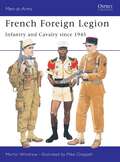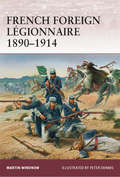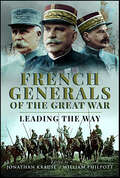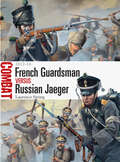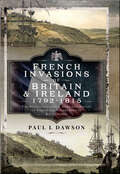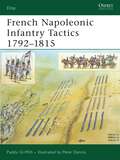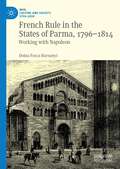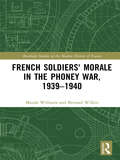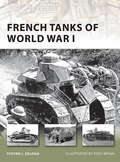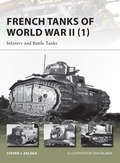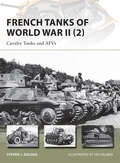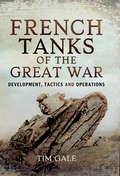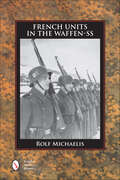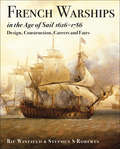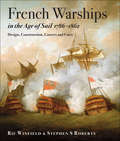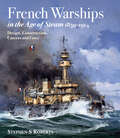- Table View
- List View
French Foreign Legion
by Martin Windrow Mike ChappellMen of action and elite soldiers with a young and dynamic spirit, the French Foreign Legion are capable of doing their duty anywhere anytime. Martin Windrow's superb text examines the history of this famous force from the end of the Second World War onward. This first class addition to the Men-at-Arms series not only contains the usual wealth of accompanying photographs and illustrations, including eight full page colour plates by Mike Chappell, but is extended by a further 16 pages, allowing the author to display the full range of his expert knowledge, including 11 pages devoted to uniforms.
French Foreign Legion 1872-1914
by Martin Windrow Mike ChappellThis volume covers the classic 'Beau Geste' period, of the French Foreign Legion when the corps was expanded during the most dynamic years of French imperial expansion. Legion battalions fought in the deserts and mountains of southern Algeria and Morocco, as well as in the jungles of North Vietnam, West Africa and Madagascar. Their varied uniforms and equipments for each period and theater are illustrated and examined. Written by a leading expert on the French Foreign Legion, this is a colorful introduction to the period when the Legion forged their legendary fighting reputation.From the Trade Paperback edition.
French Foreign Legion Paratroops
by Martin Windrow Kevin LylesThe decision, in Spring 1948, to form two battalions of Foreign Legion paratroopers was prompted by the requirement for enlarged airborne forces in the First Indochina War (1946), and the healthy recruitment then employed by the Legion. There were some initial doubts. The Legion were known to be magnificent heavy infantry, but were felt by some to lack the flexibility and agility demanded by independent airborne operations. In the Legion itself there were some misgivings over the possible clash between the self-consciously exclusive 'para mentality', and the Legion's own very marked ésprit de corps. Over time, however, all these doubts evaporated with experience.
French Foreign Legionnaire 1890-1914
by Martin Windrow Peter DennisFollowing the close of the Franco-Prussian War (1870-1871) and the establishment of the Third Republic, France embarked upon a new wave of colonialism, acquiring addition territories in Southeast Asia, including Tonkin and Annam which, together with Cambodia and Cochinchina, formed French Indochina. In North Africa their influence increased, with Tunisia acquired as a protectorate in 1881, until by the turn of the century much of North, West and Central Africa was under their control. France needed and army to police these new territories, and one of then most important elements of their colonial establishment was the French Foreign Legion. Originally founded in 1830, the Legion saw some its finest hours in North Africa and Indochina in the late 19th and early 20th centuries, and it is this period of the legions' history that has been immortalized in popular culture in works such as Beau Geste. Drawing on memoirs and other period sources, this book covers a wide range of environments and types of action and will be a valuable reference to any scholar of the legionnaires.From the Trade Paperback edition.
French Fortresses in North America 1535-1763
by Rene Chartrand Donato SpedaliereFollowing the discovery of America by Columbus in 1492, European colonists brought their system of fortification to the New World in an attempt to ensure their safety and consolidate their conquests. French and British explorers came later to North America, and thus the establishment of their sizeable settlements only got under way during the 17th century. The inhabitants of New France built elaborate fortifications to protect their towns and cities. This book provides a detailed examination of the defenses of four of them: Québec, Montréal and Louisbourg in Canada, and New Orleans in Louisiana.
French Generals of the Great War: Leading the Way
by William Philpott Jonathan KrauseWho were the senior generals who took France through the First World War, and why do we know so little about them? They commanded the largest force on the Western Front through both humiliating defeats and forgotten victories; they won international respect and adoration, but also led their army to infamous mutiny. Nevertheless, the French and their allies, under a French General in Chief, would eventually achieve final victory over Imperial Germany. It is extraordinary that this remarkable group of men has been so neglected in histories on the war. Previous studies are outdated and haven't tapped the wealth of primary source material in France's military archives. It is this gap in the literature and in the understanding of the conflict that this thought-provoking and original volume is designed to address. It takes a collective biographical approach to the leading French soldiers who ran the war on the Western Front.
French Guardsman vs Russian Jaeger
by Mark Stacey Laurence SpringAfter Napoleon's abandonment of Moscow on 18 October 1812, throughout the subsequent Wars of Liberation that saw most of Europe turn against the French and right up to the capitulation of Paris on 31 March 1814, it was the vast armies of Imperial Russia that bore the brunt of the fighting against forces of France and her dwindling list of allies. The Russian Jaegers - nominally skirmishers, but in reality spearhead troops tasked with a host of different and demanding battlefield roles, from storming villages to defending strongpoints - were a relatively new arm of service that gained enormously in combat experience and prestige in the bitter struggle to rid Europe of Napoleon's armies. The French Emperor's Young Guard - elite assault troops hand-picked from the best conscripts available - expanded hugely in the first months of 1813, eventually forming four divisions, and became the main strike force of the French field armies in the battles for Germany and France in 1813-14.These two forces clashed repeatedly during the period. At Krasnoe, southwest of Smolensk, the Russian forces overtook the retreating French army and threatened the invaders' road home, and so on 17 November 1812 the 1er Tirailleurs and 1er Voltigeurs of Roguet's 2nd Guard Infantry Division were ordered to take and hold the town of Uvarovo to cover the retreat of other French troops, clashing with the Tsar's Lifeguard Jaegers among others; although they held off the Russians and allowed Napoleon's decimated forces to evade capture, the two senior Young Guard regiments suffered appalling casualties. At the climactic battle of Leipzig nearly a year later the Finland Lifeguard Regiment, equipped and trained as Jaegers, took part in the Russian 2nd Lifeguard Infantry Division's successful counter-attack on the hotly contested Saxon village of Gossa on 16 October 1813, ejecting the French garrison, which included several Voltigeur regiments of Oudinot's I Infantry Corps of the Young Guard. At Craonne, near Reims, the veteran 14th Jaegers played a key role in frustrating Napoleon's plans to advance on Laon; these crack troops defended their well-sited emplacements for several hours, throwing back the Tirailleurs and Voltigeurs of Meunier and Curial's Young Guard divisions, which had attacked prematurely over difficult ground under heavy artillery fire.Featuring specially commissioned artwork, expert analysis and carefully chosen first-hand accounts, this absorbing study traces the evolving trial of strength between Russia's Jaegers and France's Young Guardsmen by examining three key clashes at unit level.
French Head Quarters 1915-1918
by Jean De PierrefeuA Journalist in charge of the daily military communiques at French headquarters gives his view of the events as he saw them under the changing French war leadership.Although information on the early years of Jean de Pierrefeu is sketchy, even in his native France, however it is known that he started his journalistic career in 1905 and by 1908 was working for the political weekly L'Opinion. He career continued, leaning toward nationalist sympathies, until he was mobilized as part of the French Army reserves. Swiftly wounded and invalided out of the line, he began working for the Grand Quartier-Général in 1915 as part of the staff dealing with the evening new bulletins. He would have to use all of his journalistic skill to be as economical with the brutal truth of the losses and reverses at the front suffered by the French during 1915-1918. During this period he met with all of the senior officers of the French High Command of whom he had varied opinions of their skill; it was during this time that he began to become disillusioned with the French leadership. After the First World War ended Pierrefeu sharpened his criticisms and published his damning criticism of the French Army as "French Headquarters, 1915-1918". He is frequently critical of his superiors and the elegant lifestyle at headquarters and holds back nothing in his vivid depiction of army life."The writer of this amusing book had the task of drawing up each evening the communiqué of French General Headquarters. What he writes is military gossip rather than military history, but he gives an interesting insight into the life of the headquarters under Joffre, Nivelle, and Pétain."-- p. 67 Cyril Falls. War Books, London, 1930.
French Invasions of Britain and Ireland, 1797–1798: The Revolutionaries and Spies who Sought to Topple the Government of King George
by Paul L. DawsonNot since 1066 – at least in popular myth – has an enemy force set foot on British soil. The Declaration of War with Revolutionary France in 1793 changed all that. In Ireland, the desire for home rule led Irish republicans to seek support from France and like-minded radicals in England. The scene was set for the most dangerous period in British history since William the Conqueror. Irish dreams of independence, and of Revolutionary France’s goal of securing her borders against the monarchies of Europe, coalesced. What better way of keeping Britain out of a war if her troops were tied down in Ireland? If the French could support an Irish Revolution, this would ensure the British Crown would be more focused on internal security than fighting overseas. The French, with a network of secret agents in Ireland and England, made their preparations for invasion The invasion plan had been prepared by the English-born American political activist, philosopher, theorist and revolutionary Thomas Paine, whose writings had helped inspire the Americans to fight for independence from Britain. Paine sought to seize on discontent in England against the government of William Pitt and the increasing radicalism fostered by Wolfe Tone in Ireland for home rule, to topple the government, and bring about an Irish and English Republic. A network of spies spread out across the England, Scotland and Ireland gathering information for the French and arming radical groups. Everything was set for an invasion. Mad King George’s throne was set to be toppled, Charles James Fox installed as leader of the embryonic English Republic, while Ireland, under Wolfe Tone, would have home rule – so too Scotland. But it took six years for the French to finally mount their attacks upon Britain. And when the invasions were eventually launched, they crumbled into chaos. This book seeks to charts the events that led up to the French invasion of Ireland in 1798, and how the invasion was foiled by William Pitt’s own web of secret agents. William Huskisson, best known for being killed at the opening of the Liverpool and Manchester Railway, led a dangerous life as a spy master, whose agents foiled the French at every step. Drawing on documents in the French Army Archives, as well as the records of the French Foreign Ministry and The National Archives in London, the largely forgotten story of the last invasion of Britain in 1797, as well as the final act of 1798, is revealed. Key documents are the campaign diary of the French commander from 1798, General Humbert, which has never been published in French or English. This, then, is the complete untold story of the French invasions and their sabotage, told for the first time in some 200 years.
French Napoleonic Infantry Tactics 1792-1815
by Peter Dennis Paddy GriffithOsprey's examination of French infantry tactics during the Napoleonic Wars (1799-1815). For over 20 years France was the dominating, controlling and conquering power of the western world, a result not only of Napoleon's inspired leadership, but of the efforts of almost an entire generation of Frenchmen under arms. The French Revolution heralded both social change and a seismic shift in how armies were organized, trained and deployed. This book provides an analysis of the preparation of French troops from manual regulations to the training ground, studying the changing quality of command and control within the army, which initially ensured that the French infantry were virtually unstoppable. Paddy Griffith not only explores the role of the French infantry at the apex of their powers and their actions in key battles, but also provides a detailed explanation of their eventual decline leading to defeat at Waterloo, providing a critical overview of French Napoleonic infantry tactics.
French Revolutionary Infantry 1789-1802
by Terry Crowdy Patrice CourcelleThe years immediately following the French Revolution of 1789 saw an extraordinary transformation of the French army. From a distrusted instrument of the feudal power of the king and nobility, it became the symbol of liberty and citizenship. The transition was complex and painful, as the remnants of the old professional army were joined by a flood of civilian volunteers and conscripts, of whom even the best were short of everything except republican fervour. This book describes the stages of the rebirth that produced an army capable of beating off half the monarchies of Europe, thus laying the foundations for Napoleon's unique victories ten years later.
French Revolutionary Infantryman 1791-1802
by Christa Hook Terry CrowdyThis title, a prequel to Warrior 57 French Napoleonic Infantryman 1803-15, concentrates on the period from the storming of the Bastille in 1789 until Bonaparte's election as Consul for Life in 1802. The meticulously researched text provides an authentic portrait of military life during the Revolution and beyond, with excellent use of contemporary sources, including many illuminating and vivid quotations from the memoirs and letters of those who served during the 'Wars of Liberty'. It follows typical volunteers of 1791, through the early stages of the war, the Civil War in the west of France and into Bonaparte's second Italian campaign, culminating in the Battle of Marengo in 1800.
French Rule in the States of Parma, 1796-1814: Working with Napoleon (War, Culture and Society, 1750 –1850)
by Doina Pasca HarsanyiThis book addresses the interplay between collaboration and resistance during the Revolutionary/Napoleonic era in the Duchies of Parma, Piacenza and Guastalla, renamed States of Parma in 1802 and Department of Taro in 1808. Considered no more than a docile backwater in 1796, the country exploded in violent rebellion at the end of 1805, to the astonishment of the French imperial establishment and of Napoleon himself. Yet, the insurgency – duly suppressed by the French military – did not beget further confrontation. French administrators determined to demonstrate that the empire was a force for good and local citizens compelled to reassess their circumstances realistically settled for cooperation in the form of protracted give and take arrangements. In recounting the events, this book highlights local agency and the myriad ways Parma’s population harnessed the power of empire to shape what eventually became the Napoleonic legacy in the region.
French Soldier in Egypt 1798-1801
by Christa Hook Terry CrowdyThis book concentrates on the dramatic experiences of Napoleon's Army of the Orient in Egypt and the Holy Land. The fighting of the Mamelukes and Turks are covered in depth, detailing desert combat, siege warfare, cavalry skirmishes and the suppression of uprisings. It examines the French treatment of prisoners as well as the fate of captured Frenchmen, and describes caring for the wounded, outbreaks of bubonic plague, and the terrible retreat from Acre in 1799, in accounts by the men who were there. The experiences of infantry, cavalry and sea soldiers of Napoleon's Army of the Orient are brought vividly back to life.
French Soldiers' Morale in the Phoney War, 1939-1940 (Routledge Studies in the Modern History of France)
by Bernard Wilkin Maude WilliamsThe collapse of the French army in 1940 is a well-researched topic in Second World War Studies but a surprising gap in the historiography emerges when it comes to the study of the French military prior to the German offensive of May 1940. Using various public and private sources in different languages, this book aims to address this gap by studying morale on the frontline and its management by the French Government, the Grand Quartier Général, at the scale of the regiment and on a personal level. This research also investigates German and British propaganda in French and aimed at the French sector of the frontline in order to offer the first comprehensive comparative study of French army morale in any language.
French Tanks of World War I
by Steven Zaloga Tony BryanThis title examines the emergence of the first modern tank, the Renault FT. It is a little known fact that France fielded more tanks in World War I than any other army. However, France's early tanks suffered from poor mobility and armor compared to their contemporaries. Indeed, their initial use on the Chemin des Dames in 1917 was a bloody fiasco. In spite of initial set-backs, the French army redeemed its reputation with the Renault FT. The Renault FT pioneered the modern tank design, with armament in a revolutionary central turret and the engine in the rear. More importantly, the Renault was designed to be cheap and easy to manufacture. Discover the history of the early French armor developments and their triumphant new design, the Renault FT, that helped to turn the tide of war in the favor of the Allies.From the Trade Paperback edition.
French Tanks of World War II
by Steven Zaloga Ian PalmerAll the French medium and heavy tanks of 1940 are in this title: Renault FT, Renault R-35, FCM-36, Hotchkiss H.38, Char B1bis, Renault D-1, and Renault D-2.The first volume of this two part series will cover the infantry tanks and battle tanks that served in 1940. Starting with the Renault FT of World War I fame, it will cover the modernization of the FT in the inter-war years. The focus of the infantry tank section will be on the attempts to replace the FT with designs such as the Renault R-35, FCM-36, and the Hotchkiss H.38. Derivatives of these types will also be covered such as the R-40. France also had a separate family of battle tanks starting with the Renault D-1, Renault D-2, and finally the best known tank of the campaign, the Char B1 bis. This book will provide a brief development account these tanks types, covering the tactical rationales for their design and their basic technical features. It will also briefly address their performance in the 1940 campaign, pointing out the salient features of the combat record.
French Tanks of World War II
by Steven ZalogaThe design quality of France's armored vehicles is somewhat forgotten in light of the myth of superiority surrounding the German Panzers' role in the Blitzkrieg against France, Belgium and the Netherlands.The second volume of two covering the French tanks of World War II, this title focuses primarily on the design, development, combat performance, and technical features of France's armored cavalry vehicles, including the AMR and AMC families of light reconnaissance tanks, and the famous Somua S.35 cavalry tank. Also examined are the wide array of armored cars and half-tracks employed by the French Cavalry, and the extensively produced Hotchkiss H-35/H-39 series that was designed for the Cavalry but also saw widespread use by the Infantry. This volume also looks at the specialized armored vehicles used by the French military, including the Chenillette US, Lorraine, and the various tank destroyer types brought hastily into service in 1940.
French Tanks of the Great War: Development, Tactics and Operations
by Tim GaleA detailed history of France&’s development of tanks and the combat the tanks served in during World War I, by an armored warfare expert. The French tank corps was an essential part of the French army from 1917 onwards, yet its history has been strangely neglected in English accounts of the Western Front. Using information derived from the French military archives at Vincennes—much of which has never been published in English before—author Tim Gale describes the design and development of the tanks, the political and organizational issues that arose between the French military and civilian bureaucracy, and the record of these pioneering fighting vehicles in combat. All the major engagements in which French tanks participated are depicted in graphic detail, often quoting directly from recollections left by individual tank commanders of their experience in battle, and each operation is assessed in terms of its impact on French tactics in general and on tank tactics in particular. The Nivelle offensive and the battles of Malmaison, the Matz, Soissons, and Champagne are featured in the narrative, and the actions of the French tanks serving with the U.S. army are covered, too. Much of the material in Tim Gale&’s study will be entirely new to non-French speakers. The story will be fascinating reading for anyone who is interested in the Great War, the French army, military innovation and the history of armored warfare.Praise for French Tanks of the Great War&“Gale&’s book . . . is very easy to dip into.&” —Military Modelling&“It is a wealth of information and I would definitely recommend it.&” —Forgotten Weapons
French Units in the Waffen-SS
by Rolf MichaelisConcise history of the French Waffen-SS units in WWII
French Warship Crews 1789-1805
by Steve Noon Terry CrowdyThis book gives a detailed and authentic account of the life and experiences of French warship crews from the French Revolutionary Wars (1792-1802) up to Trafalgar. It describes the recruitment and composition of crews, the different duties performed and the living conditions they had to endure at sea. Their experiences of fighting the British are covered in depth; from preparing the ship for action, to the violent discharges of heavy calibre guns, the often gruesome realities of sea warfare are revealed through pictures and contemporary testimonies.
French Warships in the Age of Sail, 1626–1786: Design, Construction, Careers And Fates
by Rif WinfieldThe origins of a permanent French sailing navy can be traced to the work of Cardinal Richelieu in the 1620s, but this naval force declined rapidly in the 1650s and a virtually new Marine Royale had to be re-created by Colbert from 1661. Thereafter, Louis XIV"s navy grew rapidly to become the largest and most powerful in the world, at the same time establishing a reputation for the quality of its ship design that lasted until the end of sail. The eighteenth century was to see defeat and decline, revival and victory, but by 1786 the French Navy had emerged from its most successful naval war having frequently outfought or outmanoeuvred the British Navy in battle, and in the process making a major contribution to American independence.This book is the first comprehensive listing of these ships in English, and follows the pattern set by its companion volume on the 1786–1861 period in providing an impressive depth of information. It is organised by Rate, classification and class, with significant technical and building data, followed by highlights of the careers of each ship in every class. Thus for the first time it is possible to form a clear picture of the overall development of French warships throughout the whole of the sailing era.Certain to become the standard English-language reference work, its publication is of the utmost importance to every naval historian and general reader interested in the navies of the sailing era.
French Warships in the Age of Sail, 1786–1861: Design, Construction, Careers and Fates
by Rif Winfield Stephen S RobertsIn 1786 the French Navy had just emerged from its most successful war of the eighteenth century, having frequently outfought or outmanoeuvred the Royal Navy in battle, and made a major contribution to American independence. The reputation of its ship design and fighting skills never stood higher, yet within a few years the effects of the French Revolution had devastated its efficiency, leading to defeat after defeat. Fine ships continued to be built, but even under Napoleon's dynamic influence the navy never recovered sufficiently to alter the balance of sea power. It was only after 1815 that the navy revived, espousing technical innovation and invention, to produce some of the most advanced ships of the age.This book is the first comprehensive listing of these ships in English, and follows the pattern set by the companion series on British warships in the age of sail in providing an impressive depth of information. It is organised by Rate, classification and class, with significant technical and building data, followed by a concise summary of the careers of each ship in every class. Thus for the first time it is possible to form a clear picture of the overall development of French warships in the latter half of the sailing era.
French Warships in the Age of Steam 1859–1914
by Stephen S. Roberts“This outstanding book will be essential for future studies of naval policy in the period between la Gloire and the Great War.” —The Naval ReviewThis book is the first comprehensive listing in English of more than 1400 warships that were added to the official French navy fleet list between 1 January 1859 and World War I. It includes everything from the largest battleships to a small armoured gunboat that looked like a floating egg. Reflecting the main phases of naval policy, the ships are listed in three separate parts to keep contemporary designs together and then by ship type and class. For each class the book provides a design history explaining why the ships were built, substantial technical characteristics for the ships as completed and after major reconstructions, and selected career milestones including the ultimate fate of each ship. Following the earlier volumes written jointly with Rif Winfield, French Warships in the Age of Sail 1626–1786 and French Warships in the Age of Sail 1786–1861, this trilogy now provides a complete picture of the development of French warships over a period of almost three centuries.“As a technical reference on the French ships of 1859 to 1914, this book is a must for the serious naval architecture student, modeler, or enthusiast. So much solid information is packed in this book, arranged logically, clearly and with so many illustrations, I cannot see where another volume on this subject can compete. Highly recommended!” —Nautical Research Journal“Superlatives abound in describing this book, arguably the finest naval ‘shiplist’ ever created.” —Warship International
French and American Prisoners of War at Dartmoor Prison, 1805-1816: The Strangest Experiment
by Neil DavieThis book explores the history of Dartmoor War Prison (1805-16). This is not the well-known Victorian convict prison, but a less familiar penal institution, conceived and built nearly half a century earlier in the midst of the long-running wars against France, and destined, not for criminals, but for French and later American prisoners of war. During a period of six and a half years, more than 20,000 captives passed through its gates. Drawing on contemporary official records from Britain, France and the USA, and a wealth of prisoners’ letters, diaries and memoirs (many of them studied here in detail for the first time), this book examines how Dartmoor War Prison was conceived and designed; how it was administered both from London and on the ground; how the fate of its prisoners intertwined with the military and diplomatic history of the period; and finally how those prisoners interacted with each other, with their captors, and with the wider community. The history of the prison on the moor is one marked by high hopes and noble intentions, but also of neglect, hardship, disease and death
